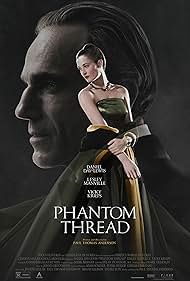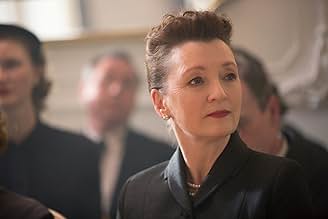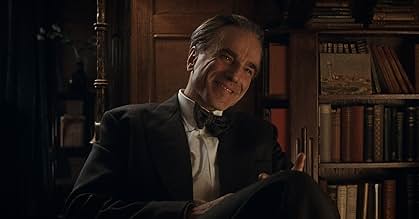Set in 1950s London, Reynolds Woodcock is a renowned dressmaker whose fastidious life is disrupted by a young, strong-willed woman, Alma, who becomes his muse and lover.Set in 1950s London, Reynolds Woodcock is a renowned dressmaker whose fastidious life is disrupted by a young, strong-willed woman, Alma, who becomes his muse and lover.Set in 1950s London, Reynolds Woodcock is a renowned dressmaker whose fastidious life is disrupted by a young, strong-willed woman, Alma, who becomes his muse and lover.
- Director
- Writer
- Stars
- Won 1 Oscar
- 55 wins & 121 nominations total
- Director
- Writer
- All cast & crew
- Production, box office & more at IMDbPro
Featured reviews
First of all - what a cowboy name for a designer!
I like the title letters, they are like the endless knot. And so is this movie. It leads nowhere, but strangely finds a cure for sociopaths. Give them a little bit of their own poison and you will live happily ever after. Maybe. This notion is the best that this film gives you, even better than the production design. I really liked the wallpapers so I won't complain about the production value, style over substance, and so on. It's brave to try to cover the truth with lots of lace and chiffon to make it watchable because the result may be pretentious and boring. And then if the truth isn't necessarily cathartic, the mushrooms are. But, to like the film I need to like the characters and they are not likable. I can't imagine what he sees in her or what she sees in him. The motif of poisonous love games and the uncertainty of love has been better used by François Truffaut in his Mississippi Mermaid (1969).
7axb
Let us get this out of the way- Phantom Thread is a beautiful film with a great premise and promise. A couture dress designer (Daniel Day Lewis) is demanding in the extreme and finds a muse (Vicky Krieps). He enjoys using her as a dress model and a companion, but she wants more. Along the way, the director, Paul Thomas Anderson, throws hints of intrigue starting with the title of the film. There are empty pretensions of dress-making as high art, secret messages sown into dresses and haunting memories. All of this leads to- exactly nowhere. Everything Lewis and Krieps do is recorded lovingly and meticulously on film with great mood music in the background. But there is no great reveal, no deep insight into human psyche, no higher truth. In the end it comes down to what a woman wants and what the man can live with. Lewis and Krieps are excellent, especially Krieps, but Lesley Manville as Lewis's sister has the thankless job of looking stern in every scene. Nothing in the film sticks with you when you leave the theater except the dresses, photography and the music; because Anderson has not come up with anything really interesting in the story. Unlike his "There Will Blood", which was a great film, Phantom Thread is a phantom film. It is a beautiful ghost of what should have been a really good film. See it if you wish to say goodbye to Daniel Day Lewis, but keep your expectations low.
Intimate, delicate, and a beautifully crafted masterpiece. Paul Thomas Anderson manages to expresses an artist's creative journey through threads of fashion and romance with such subtlety that it could only be conveyed through the medium of film. An atmosphere reminiscent of Kubrick's achievements, this romantic odyssey illustrates a unique perspective of love; a perspective in which love is shaped and manipulated by the fragile strings of each character's hearts.
To begin with, I will praise an awfully disregarded aspect of "Phantom Thread": the cinematography and direction. The style and manner in which Paul Thomas Anderson uses silence and long takes is ingenious, and as stated above, was most likely inspired from Kubrick's works. Similar to the quote, "The less you say, the more your words will matter," the more silence, the more each line will signify. The more long takes, the more each short take will signify. Therefore, this method permits a greater control over the variety of dramatic effects; and in turn, the audience's emotions. Anderson also utilized this technique in many of his other films, including "The Master", "Magnolia", and his masterpiece, "There Will Be Blood".
Of course, this strategy doesn't always serve well. The more the audience regards the dialogue, the more engaging the screenplay has to be. The more engaging the screenplay is, the more compelling the performances have to be.
Yet "Phantom Thread" has all of this. Magnificent lead performances by Daniel Day-Lewis and Vicky Krieps, a strong and often overlooked supporting performance by Lesley Manville, and a sharp, dense original screenplay written by Paul Thomas Anderson himself. A few sprinkles of comedy are also blended in the script, which is always valuable for a romance. Not to forget the costume design either, which was essential to establish a post-war 1950s London environment.
And finally, the score. Arguably the strongest part of the film, the score possesses Paul Thomas Anderson's signature strange aura that is found in several of his other films. It's not a coincidence that one of his most frequent collaborators is Jonny Greenwood, who composed the score for this film, "There Will Be Blood", and many others. While most movies nowadays would use music to heighten drama, Paul Thomas Anderson rejects the common norm; valuing music to form an atmosphere. This atmosphere is crucial in almost all of his works, creating an eerie tone for a mystery that drives the story forward.
A transcendental and sublime work of art so remarkably subtle- delicately transfixing the audience ever so slightly, exploring the convoluted depths of an artist's obsession, and expanding cinema's horizons for miles of wonder- all woven beneath the intertwined threads of the phantom.
Farewell, Daniel Day-Lewis. We will miss you.
To begin with, I will praise an awfully disregarded aspect of "Phantom Thread": the cinematography and direction. The style and manner in which Paul Thomas Anderson uses silence and long takes is ingenious, and as stated above, was most likely inspired from Kubrick's works. Similar to the quote, "The less you say, the more your words will matter," the more silence, the more each line will signify. The more long takes, the more each short take will signify. Therefore, this method permits a greater control over the variety of dramatic effects; and in turn, the audience's emotions. Anderson also utilized this technique in many of his other films, including "The Master", "Magnolia", and his masterpiece, "There Will Be Blood".
Of course, this strategy doesn't always serve well. The more the audience regards the dialogue, the more engaging the screenplay has to be. The more engaging the screenplay is, the more compelling the performances have to be.
Yet "Phantom Thread" has all of this. Magnificent lead performances by Daniel Day-Lewis and Vicky Krieps, a strong and often overlooked supporting performance by Lesley Manville, and a sharp, dense original screenplay written by Paul Thomas Anderson himself. A few sprinkles of comedy are also blended in the script, which is always valuable for a romance. Not to forget the costume design either, which was essential to establish a post-war 1950s London environment.
And finally, the score. Arguably the strongest part of the film, the score possesses Paul Thomas Anderson's signature strange aura that is found in several of his other films. It's not a coincidence that one of his most frequent collaborators is Jonny Greenwood, who composed the score for this film, "There Will Be Blood", and many others. While most movies nowadays would use music to heighten drama, Paul Thomas Anderson rejects the common norm; valuing music to form an atmosphere. This atmosphere is crucial in almost all of his works, creating an eerie tone for a mystery that drives the story forward.
A transcendental and sublime work of art so remarkably subtle- delicately transfixing the audience ever so slightly, exploring the convoluted depths of an artist's obsession, and expanding cinema's horizons for miles of wonder- all woven beneath the intertwined threads of the phantom.
Farewell, Daniel Day-Lewis. We will miss you.
In early 1950's Britain, Reynolds Woodcock (Daniel Day-Lewis) is the most sought-after dress designer among the rich and powerful. He lives a regimented, almost monastic life, with his watchful sister Cyril (Lesley Manville) as his close associate. One day Reynolds meets waitress Alma (Vicky Krieps) and takes her on as his muse, model, lover, whatever he needs. Alma learns that she's not the first to fill this position in Reynolds' life, but she becomes determined to be the last.
I could care less about the fashion world or Haute Couture, and yet I still was drawn into the single-minded obsessive artistry of Reynolds' world, his strict discipline and pursuit of perfection within his chosen field. Alma acts as an audience surrogate, unsure of this odd world led by the often inscrutable Reynolds and Cyril, the latter of whom often has the charm of an asp. But as Alma begins to see the way things work in this cloistered, rarefied world, she begins to find ways to upset it and bend it to her advantage. Cyril is naturally distrusting of this latest distraction, but Reynolds seems to find something in this new, shaky lifestyle of uncertainty.
The performances are fantastic, with Day-Lewis once laying claim to the title of greatest actor of his generation. He complex, unique yet very real, without a single false note. Manville was also singled out for awards consideration, and she's scary, pitiful, powerful, and voice for order and tradition. Vicky Krieps, a native of Luxembourg, is subtle, sharp, and a match for Day-Lewis as the seemingly simple, unworldly Alma.
The filmmaking is concise and largely unobtrusive, letting the characters do the work, often with silent looks and facial expressions. Director Anderson did not use a Director of Photography on this, instead working with the camera operators themselves. The result is spontaneous but not amateur looking, with a slight gritty haze that makes many scenes almost dream-like. It's not a look that I would like to see in a lot of films, but it works here among the chilly environments both exterior and interior. The score by Jonny Greenwood, guitarist and songwriter from Radiohead, is surprisingly subdued, mainly light piano pieces, with some flourishes when needed.
I won't pretend that a lot of viewers will like this, as they might find it slow, pretentious, boring, or pointless. I certainly did not, and found it a deep, and even deeply disturbing, look at a unique type of love fostered by unusual people, told in a compelling, if quiet, way. This is more for the Masterpiece Theatre crowd than the Fast and the Furious crowd. I would rank this among the very best of the year 2017. Highly Recommended.
I could care less about the fashion world or Haute Couture, and yet I still was drawn into the single-minded obsessive artistry of Reynolds' world, his strict discipline and pursuit of perfection within his chosen field. Alma acts as an audience surrogate, unsure of this odd world led by the often inscrutable Reynolds and Cyril, the latter of whom often has the charm of an asp. But as Alma begins to see the way things work in this cloistered, rarefied world, she begins to find ways to upset it and bend it to her advantage. Cyril is naturally distrusting of this latest distraction, but Reynolds seems to find something in this new, shaky lifestyle of uncertainty.
The performances are fantastic, with Day-Lewis once laying claim to the title of greatest actor of his generation. He complex, unique yet very real, without a single false note. Manville was also singled out for awards consideration, and she's scary, pitiful, powerful, and voice for order and tradition. Vicky Krieps, a native of Luxembourg, is subtle, sharp, and a match for Day-Lewis as the seemingly simple, unworldly Alma.
The filmmaking is concise and largely unobtrusive, letting the characters do the work, often with silent looks and facial expressions. Director Anderson did not use a Director of Photography on this, instead working with the camera operators themselves. The result is spontaneous but not amateur looking, with a slight gritty haze that makes many scenes almost dream-like. It's not a look that I would like to see in a lot of films, but it works here among the chilly environments both exterior and interior. The score by Jonny Greenwood, guitarist and songwriter from Radiohead, is surprisingly subdued, mainly light piano pieces, with some flourishes when needed.
I won't pretend that a lot of viewers will like this, as they might find it slow, pretentious, boring, or pointless. I certainly did not, and found it a deep, and even deeply disturbing, look at a unique type of love fostered by unusual people, told in a compelling, if quiet, way. This is more for the Masterpiece Theatre crowd than the Fast and the Furious crowd. I would rank this among the very best of the year 2017. Highly Recommended.
Quiet movies are not usually my thing. I like pace and story and energy. But this film crackles in the quiet. PTA makes every scene feel like a battle, and the actors' performances rise to that challenge. It may be a quiet movie about a dress maker, but it is so much more - a battle of wills, a tension against each seam, a few characters slowly resigning themselves to something other than what they planned. If you described the plot, I would be like, "Really? That is the story?" After watching it, I can say it is not just a story...it is a great story.
Did you know
- TriviaPaul Thomas Anderson got the initial idea for the film while he was sick in bed one day. His wife, Maya Rudolph, was tending to him and gave him a look that made him realize that she had not looked at him with such tenderness and love in a long time.
- GoofsA character says, "I don't mean to be racist..." That word didn't exist, at least in British English, in the 1950s. Someone might have used "racialist".
- Quotes
Reynolds Woodcock: Kiss me, my girl, before I'm sick.
- Crazy creditsThe typeface used for the credits is called Reynolds Stone and it was created by English wood engraver, typographer, and designer Reynolds Stone, who was a close friend of the parents of Daniel Day-Lewis.
- ConnectionsEdited into Funny or Die Presents...: Mugatu's Thread (2018)
- SoundtracksMy Foolish Heart
Written by Ned Washington and Victor Young
Performed by Oscar Peterson
Courtesy of The Verve Music Group
Under license from Universal Music Enterprises
- How long is Phantom Thread?Powered by Alexa
Details
- Release date
- Countries of origin
- Official sites
- Languages
- Also known as
- El hilo fantasma
- Filming locations
- Victoria Hotel, Station Road, Robin Hood's Bay, Whitby, North Yorkshire, England, UK(where Reynolds meets Alma)
- Production companies
- See more company credits at IMDbPro
Box office
- Budget
- $35,000,000 (estimated)
- Gross US & Canada
- $21,198,205
- Opening weekend US & Canada
- $216,495
- Dec 31, 2017
- Gross worldwide
- $52,204,454
- Runtime2 hours 10 minutes
- Color
- Sound mix
- Aspect ratio
- 1.85 : 1
Contribute to this page
Suggest an edit or add missing content































